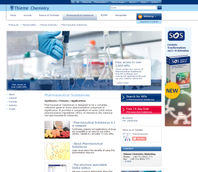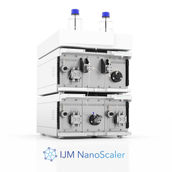Finding unknown effects of existing drugs
Proteins as the key to precision medicine
Fewer side effects, improved chances of healing: the goal of precision medicine is to provide patients with the most individualized treatment possible. This requires a precise understanding of what is happening at the cellular level. For the first time, researchers at the Technical University of Munich (TUM) have now succeeded in mapping the interactions of 144 active substances with around 8,000 proteins. The results could help to identify previously unknown potential benefits of existing drugs.
Practically all drugs either affect, produce or eliminate proteins – or are, in fact, proteins. But what exactly happens when a high or low dose is taken? And what is going on at various points in time while the drug is working? Does the drug cause the cell to produce new proteins or block the production of others? Answers to these questions have been lacking. But now, using a method known as decryptE, the team has succeeded in revealing these interactions.
Large numbers of results in a short time
To do this, the researchers treated cells with various doses of 144 active substances over an 18-hour period. Most of the drugs are already being used in cancer treatment or are in the clinical approval stage. After being extracted, the proteins were analyzed with mass spectrometry. The team then used the data to study the cell reactions. This yielded more than one million dose-response curves showing the mechanisms behind the effects of the active substances over the course of treatment.
The results have now been published in the journal Nature Biotechnology by Bernhard Küster, professor of proteomics and bioanalytics at the TUM School of Life Sciences, Nicola Berner, Stephan Eckert and a team of researchers coordinated at the TUM Chair of Proteomics and Bioanalytics. The data is available to the global research community in the ProteomicsDB database and the associated app.
Recognizing the potential of existing drugs
Cancer is a prime example of why a detailed understanding of these processes is so important: Depending on the type of cancer, very different things are happening at the molecular level. This is decisive for selecting suitable treatments and may offer clues for the development of new drugs. With the data the team was able to show, for example, that the immune system can be weakened by a class of drugs known as HDAC inhibitors. This can in turn affect the treatment of tumors that leverage the immune system.
The fact that the team were able to make this finding without having looked for it can be attributed to the way decryptE works. Experiments are generally designed to study a well-defined question and, ideally, to produce an answer. By contrast, decryptE records everything that happens – and generates huge amounts of data that researchers can now analyze with digital methods and in terms of various questions. The team is hoping that the results will also harbor insights into previously undiscovered effects of widely used drugs.
“Many drugs can do more than we think,” says Bernhard Küster. “A familiar example is Aspirin. Its effectiveness as a painkiller was well established. But observations showed that the effective ingredient, acetylsalicylic acid (ASA), also has a blood thinning effect. Nowadays it is routinely given to patients who suffer a stroke or heart attack. We believe that many widely used drugs will also have effects of which we are still unaware. One of the goals of our research is to systematically seek them out without having to wait for such accidental discoveries.”
Original publication
Stephan Eckert, Nicola Berner, Karl Kramer, Annika Schneider, Julian Müller, Severin Lechner, Sarah Brajkovic, Amirhossein Sakhteman, Christian Graetz, Jonas Fackler, Michael Dudek, Michael W. Pfaffl, Percy Knolle, Stephanie Wilhelm, Bernhard Kuster; "Decrypting the molecular basis of cellular drug phenotypes by dose-resolved expression proteomics"; Nature Biotechnology, 2024-5-7
These products might interest you
See the theme worlds for related content
Topic World Mass Spectrometry
Mass spectrometry enables us to detect and identify molecules and reveal their structure. Whether in chemistry, biochemistry or forensics - mass spectrometry opens up unexpected insights into the composition of our world. Immerse yourself in the fascinating world of mass spectrometry!

Topic World Mass Spectrometry
Mass spectrometry enables us to detect and identify molecules and reveal their structure. Whether in chemistry, biochemistry or forensics - mass spectrometry opens up unexpected insights into the composition of our world. Immerse yourself in the fascinating world of mass spectrometry!






















































